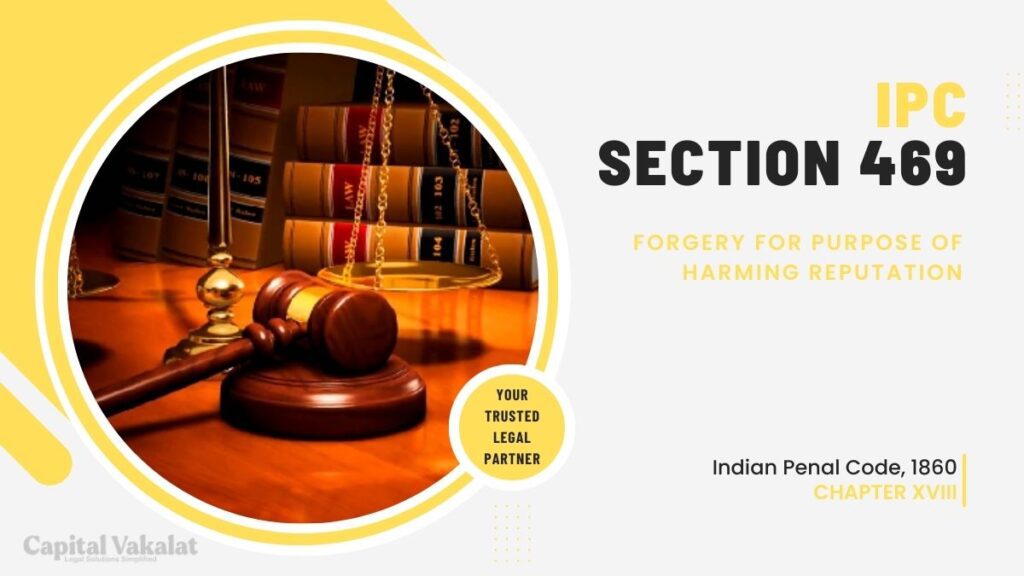Forgery, a deceptive practice that has evolved through time, takes a sinister turn when it becomes a tool for harming someone’s reputation. In the legal landscape of India, Section 469 of the Indian Penal Code (IPC) stands as a formidable deterrent against such malicious acts.

Let’s delve into the depths of Section 469 IPC, unraveling its nuances and exploring the implications of forgery for the purpose of harming reputation.
Understanding Section 469 IPC
At its core, Section 469 IPC deals with the act of forgery with the intent to harm the reputation of an individual or an entity. The section outlines the elements that constitute an offense, emphasizing the need to establish fraudulent intent. A critical aspect of this section lies in differentiating between genuine documents and those created with the explicit purpose of causing harm.
Forgery is not a victimless crime; it can have severe consequences for individuals and organizations alike. The legal repercussions for individuals found guilty under Section 469 IPC range from fines to imprisonment, depending on the severity of the offense.
Instances of Forgery for Harming Reputation
To grasp the real-world impact of Section 469 IPC, let’s explore instances where this legal provision has been applied. From forged educational certificates tarnishing personal reputations to fabricated financial documents damaging corporate entities, the range of scenarios is vast. Understanding these instances sheds light on the importance of vigilance in the face of potential reputational harm.
Types of Documents Covered
Section 469 IPC casts a wide net, covering various types of documents. Traditional documents like deeds, wills, and certificates are included, but the digital age has expanded the scope. Emails, electronic contracts, and digital signatures fall under the purview of this section, emphasizing the need for updated legislation in our technologically advanced society.
Forgery Techniques
Forgery techniques have evolved over the years, adapting to technological advancements. From the meticulous creation of counterfeit physical documents to sophisticated digital manipulation, perpetrators employ a range of methods. Understanding these techniques is crucial for individuals and organizations seeking to protect themselves from reputational harm.
Protecting Against Forgery
Preventing forgery requires a proactive approach. Individuals and businesses must adopt measures such as document verification, secure storage, and the use of advanced authentication methods. Educating employees and the public on recognizing potential forgeries is equally important in the fight against reputation-damaging acts.
Legal Recourse for Victims
For those who fall victim to forgery, seeking legal recourse is vital. Reporting the crime to law enforcement agencies initiates the process of investigation and prosecution. Section 469 IPC provides a framework for justice, ensuring that those who engage in forgery for the purpose of harming reputation face the consequences of their actions.
Landmark Cases
Examining landmark cases involving Section 469 IPC provides insight into the legal precedents set by the judiciary. These cases shape the interpretation and application of the law, establishing standards for future legal proceedings. Understanding the outcomes of such cases helps navigate the complexities of the legal landscape surrounding forgery.
Challenges in Prosecution
Prosecuting forgery cases poses challenges, particularly in the digital era where evidence may be more elusive. Establishing intent and tracing the origins of forged documents require expertise and resources. Overcoming these challenges is essential for ensuring the effectiveness of Section 469 IPC in preventing reputation harm.
Conclusion
In conclusion, Section 469 IPC serves as a crucial safeguard against forgery for the purpose of harming reputation. The law not only defines the offense but also outlines the legal consequences for those found guilty. As our society becomes increasingly reliant on digital communication and documentation, the relevance of Section 469 IPC is more pronounced than ever. Awareness, vigilance, and adherence to legal standards are key to mitigating the risk of reputational harm through forgery.
Frequently Asked Questions
What legal recourse do individuals have if they suspect forgery for the purpose of harming their reputation?
Victims can report the crime to law enforcement, initiating an investigation under Section 469 IPC.
How can businesses protect themselves from reputational harm due to forgery?
Businesses should implement document verification, secure storage, and employee education on recognizing potential forgeries.
Are there specific challenges in prosecuting forgery cases in the digital age?
Yes, challenges include tracing digital origins and establishing intent, requiring expertise and resources.
What is the significance of landmark cases in shaping the interpretation of Section 469 IPC?
Landmark cases set legal precedents that guide the interpretation and application of the law in forgery-related proceedings.